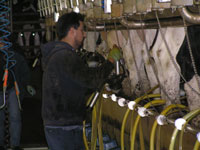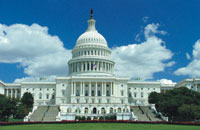 The U.S. Dairy Export Council (USDEC) and National Milk Producers Federation (NMPF) welcomed Prime Minister Shinzo Abe’s March 15 official declaration of interest for Japan to join ongoing Trans-Pacific Partnership (TPP) trade talks.
The U.S. Dairy Export Council (USDEC) and National Milk Producers Federation (NMPF) welcomed Prime Minister Shinzo Abe’s March 15 official declaration of interest for Japan to join ongoing Trans-Pacific Partnership (TPP) trade talks.
“The addition of Japan, the No. 3 economy in the world and a major dairy importer, would dramatically increase the commercial significance of the talks,” says Tom Suber, USDEC president. “Along with Canada’s recent announcement that it will join the talks, Japan’s involvement will add additional potential for greater U.S. dairy exports, which will supplement the opportunities in existing TPP participants’ markets such as Vietnam and Malaysia.”
At the same time, Japan’s enrollment brings with it certain challenges.
Japan’s entry at this stage of the talks has sparked concern that it could slow the pace of negotiations with the potential to delay or derail the ambitious outcome that the current members are seeking.
“As is the case with Canada, Japan is a large and profitable market that could provide immediate and measurable benefits for U.S. dairy producers and processors, but only if negotiators achieve real, tangible market access,” says Jaime Castaneda, senior vice president for strategic initiatives and trade policy, NMPF and USDEC. “Japan would not only need to loosen its restrictive market access scheme, but also liberalize its complex quota system and address non-tariff trade concerns, such as how its food additive approval system currently operates.”
From the beginning, the TPP talks have been about more than just lowering tariffs. USDEC, NMPF and other U.S. agricultural groups have viewed the TPP as an opportunity to defend the right to use common food names in the face of the European Union’s aggressive efforts to confiscate those names through its restrictive geographical indication system.
USDEC and NMPF have also led a broad coalition calling for effective disciplines on the application of sanitary and phytosanitary (SPS) measures in TPP negotiations—disciplines that place greater reliance on science-based regulations and are fully enforceable, while also going beyond the World Trade Organization’s SPS Agreement on these and related issues.
“The U.S. dairy industry sees real value in the TPP negotiations if we are able to open new markets, like Japan and Canada, use the TPP process to strengthen global trading rules and secure meaningful competition policy changes in New Zealand’s dairy sector,” says Suber.
Current U.S. dairy trade with Japan speaks volumes about that nation’s potential if barriers are removed. U.S. dairy shipments rose 13 percent to $284 million in 2012, keeping Japan the fifth-largest U.S. market despite prohibitive tariffs and non-tariff barriers in many of the largest dairy categories.
The 16th round of TPP talks just concluded in Singapore; the 17th round is set to take place in May in Lima, Peru. Japan will not likely join the talks until late August. The entry of Japan will expand the TPP group to 12 countries, including Australia, Brunei, Canada, Chile, Malaysia, Mexico, New Zealand, Peru, Singapore, the United States and Vietnam. Thailand has also expressed interest in joining.
The U.S. Dairy Export Council (USDEC) is a non-profit, independent membership organization that represents the global trade interests of U.S. dairy producers, proprietary processors and cooperatives, ingredient suppliers and export traders. Its mission is to enhance U.S. global competitiveness and assist the U.S. industry to increase its global dairy ingredient sales and exports of U.S. dairy products. USDEC accomplishes this through programs in market development that build global demand for U.S. dairy products, resolve market access barriers and advance industry trade policy goals. USDEC is supported by staff across the United States and overseas in Mexico, South America, Asia, Middle East and Europe.
The National Milk Producers Federation (NMPF), based in Arlington, VA, develops and carries out policies that advance the well being of dairy producers and the cooperatives they own. The members of NMPF’s 30 cooperatives produce the majority of the U.S. milk supply, making NMPF the voice of more than 32,000 dairy producers on Capitol Hill and with government agencies.

 Last month, NMPF joined the Center for Food Integrity and the U.S. pork sector to jointly launch "
Last month, NMPF joined the Center for Food Integrity and the U.S. pork sector to jointly launch " NMPF and the
NMPF and the  As the effort to pass a farm bill continues this spring on Capitol Hill, NMPF’s Board of Directors recently reaffirmed the organization’s support for a new farm bill – containing a better safety net for dairy farmers – at the Federation’s spring meeting last month.
As the effort to pass a farm bill continues this spring on Capitol Hill, NMPF’s Board of Directors recently reaffirmed the organization’s support for a new farm bill – containing a better safety net for dairy farmers – at the Federation’s spring meeting last month. The U.S. Dairy Export Council (USDEC) and National Milk Producers Federation (NMPF) welcomed Prime Minister Shinzo Abe’s March 15 official declaration of interest for Japan to join ongoing Trans-Pacific Partnership (TPP) trade talks.
The U.S. Dairy Export Council (USDEC) and National Milk Producers Federation (NMPF) welcomed Prime Minister Shinzo Abe’s March 15 official declaration of interest for Japan to join ongoing Trans-Pacific Partnership (TPP) trade talks. NMPF Also Expresses Concern with Elimination of NASS Monthly Milk Production Report
NMPF Also Expresses Concern with Elimination of NASS Monthly Milk Production Report



